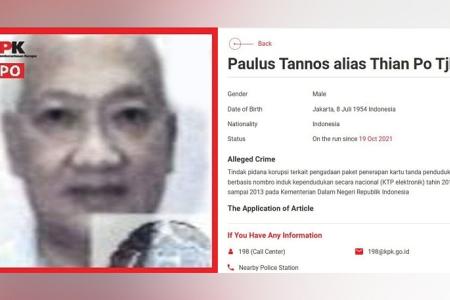CPIB arrests businessman wanted in Indonesia for alleged corruption
A businessman wanted by the authorities in Indonesia over his alleged involvement in a corruption case there has been arrested by Singapore’s Corrupt Practices Investigation Bureau (CPIB).
Through his lawyers, Paulus Tannos said during his court mention on Jan 23 that he has a diplomatic passport from West African country Guinea-Bissau.
But the State Counsel rebutted that this did not grant Paulus diplomatic immunity as he is not accredited with Singapore’s Ministry of Foreign Affairs (MFA).
CPIB said on Jan 24 in response to The Straits Times’ queries that it arrested Paulus on Jan 17 after the Indonesian government made a provisional arrest request against him.
The bureau said the matter is pending the submission of a formal extradition request by the Indonesian authorities.
“Singapore is committed to continue working closely with Indonesia on this case, in accordance with due process and the rule of law,” it added.
CPIB said it was unable to comment further as the matter is currently before the Singapore courts.
Indonesian media outlet Jakarta Globe reported on Jan 24 that Paulus is implicated in a major graft scandal involving the government’s electronic ID card (e-ID) project, which caused the state losses of about 2.3 trillion rupiah (S$192 million).
The report, which cited officials, added that Paulus has been on Indonesia’s fugitive list since Oct 19, 2021.
It said Paulus was the president and director of Shandipala Arthaputra, a technology company awarded the contract to produce part of the e-ID cards.
Paulus, who uses the alias Tjhin Thian Po, is currently remanded. He attended a hearing at the State Courts on Jan 23 via video link.
The man, who looks to be in his 60s, followed court proceedings with the help of a Bahasa Indonesia interpreter. He was represented by Mr Hamidul Haq from Rajah and Tann.
Mr Hamidul told the court there is an issue of whether his client’s detention is legal as he holds a diplomatic passport from Guinea-Bissau.
The State Counsel replied that Paulus’ possession of the passport itself does not grant him diplomatic immunity.
He said: “Based on our checks with MFA, on all three names of the fugitive... he does not have diplomatic status at this point in time.”
The State Counsel said that apart from “Paulus Tannos” and a Chinese name, the diplomatic passport uses a third name, which Paulus changed according to a deed poll.
Mr Hamidul also requested a bail hearing and cited his client’s medical condition, but did not elaborate on the condition in court.
During proceedings, District Judge Brenda Tan asked Paulus if he wished to consent to surrender to the foreign state.
Under the Extradition Act, fugitives can give consent to their extradition and waive extradition proceedings.
This is in line with international practice, to save state resources and prevent the fugitive from being detained longer than necessary in Singapore.
Paulus replied through the interpreter: “I’m willing to go back to the Guinea-Bissau country.”
When Judge Tan reminded him that the foreign state was Indonesia, Paulus said he was unwilling to be sent there.
His case will be heard again in the State Courts on Jan 28.
The extradition treaty between Singapore and Indonesia came into effect on March 21, 2024, and was hailed as a major milestone for bilateral relations.
It grants extradition for a comprehensive list of offences, including corruption, money laundering and bribery, in accordance with the laws of both countries and safeguards provided in the treaty.
The treaty with Indonesia can be retrospectively applied to crimes committed up to 18 years ago.
Get The New Paper on your phone with the free TNP app. Download from the Apple App Store or Google Play Store now


